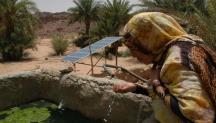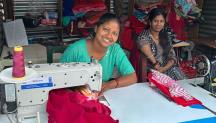

IRENA and IPCC Agree to Partner on Renewables for Climate Action at COP27
Newsletter
Agreement calls for parties to work closely together to promote the widespread adoption of renewables to bolster climate adaptation and mitigation efforts.
Sharm El-Sheikh, Egypt / Abu Dhabi, United Arab Emirates, 16 November 2022 – The International Renewable Energy Agency (IRENA) signed a Memorandum of Understanding (MoU) with the Intergovernmental Panel on Climate Change (IPCC) today. Through the partnership, the two parties agreed to exchange knowledge and collaborate on initiatives to accelerate widespread renewable energy adoption to mitigate climate change.
Mr Francesco La Camera, Director-General of IRENA, and Mr Abdalah Mokssit, IPCC Secretary, met at the United Nations Climate Change Conference COP27 in Sharm El-Sheikh to sign the MoU.
“We have all the tools we need to address the growing climate challenge,” said IRENA Director-General Francesco La Camera. “The reliability and resilience of renewables in the face of mounting global crises should serve as clear motivating factors for governments to double down on the energy transition and accelerate renewable energy deployment. Clean energy is abundant, but time is not. IRENA’s knowledge strongly builds on the valuable scientific work by the IPCC. I look forward to our continued close cooperation.”
“With current commitments, we are not on track to limit warming to 1.5°C. But, with rapid and deeper emissions cuts through 2030, we can keep this goal within reach”, said Abdalah Mokssit, the Secretary of IPCC. “Costs for some forms of renewable energy have fallen, use of renewables continues to rise and, in some countries and regions, electricity systems are already predominantly powered by renewables. We’re confident this partnership will strategically contribute to the much-needed transformational change and to a faster and sweeping transition to renewables.”
According to IRENA’s World Energy Transitions Outlook, avoiding the catastrophic consequences of 1.5°C global warming requires a fundamental change in how energy is generated and consumed. Renewables are the most readily-available and cost-effective way to provide 90 per cent of all decarbonisation by 2050, but this requires tripling of currently installed renewable power capacity by 2030. Progress will depend on political will, well-targeted investments, and a mix of technologies, accompanied by policy packages to put them in place and optimise their economic and social impact.
The signed MoU provides a framework for IRENA and IPCC to enhance understanding of the scientific basis of the risk of human-induced climate change, its potential impacts and options for adaptation and mitigation. The two organisations will also work together to to better understand the scientific basis the widespread and increased adoption and sustainable use of all forms of renewable energy through dialogues, expert meetings and workshops in coordination with the relevant IPCC Working Groups/Task Force Bureau.




